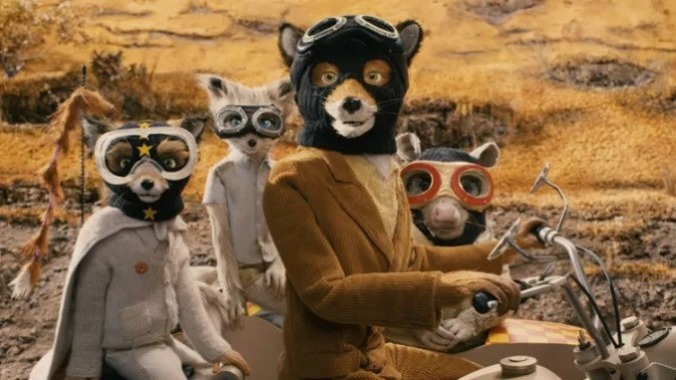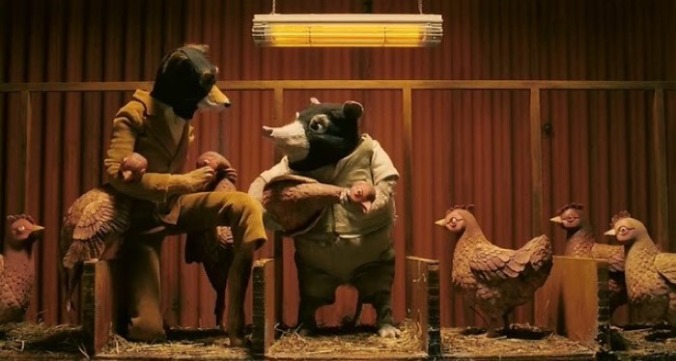15 Years of Fantastic Mr. Fox and the Quest for Affirmation

What is the role of a patriarch? What does it mean to “provide” for a family? What level of lifestyle is acceptable, in terms of the development of children and the mollification of one’s own ego? Wes Anderson’s Fantastic Mr. Fox is a film about a father grappling with these questions, a man being forced into confrontation with the overwhelming evidence of how his selfishness and desperate need for validation–disguised as magnanimousness and grandiosity–has hurt those around him, even as the same qualities are part of what attracted many of those individuals into his orbit in the first place. Fifteen years after the Oscar-nominated stop-motion animated film hit theaters in late 2009, Fantastic Mr. Fox stands out as one of Anderson’s most poignant portrayals of the stumbles of fatherhood, right there alongside more obvious examples like The Royal Tenenbaums. More so than any of his other films, though, Mr. Fox truly reckons with the psychological drive of performative masculinity, and the way such traits can be passed along through the generations unless they’re acknowledged and confronted.
George Clooney’s Mr. Fox is a family man of course, one who is now 12 “fox years” removed from his prior life of derring-do as an infamous poultry thief, after wife and partner Felicity made him swear off the dangerous lifestyle after yet another close brush with death. He’s now a stable newspaperman writing a regular column, but he struggles under the yoke of mundanity–not the least because he chafes at the mere fact that no one seems to read his dry-looking column. Lost on Mr. Fox is the fact that this job allows him to not only put food on their table, but also relocate the family into a lovely new home at the beginning of the film, albeit at some apparent financial strain. But none of it really provides satisfaction to Mr. Fox. In reality, he still feels like a failure, because in his mind providing for his family’s base physical needs isn’t enough–he also believes that they need to have the admiration and esteem that he himself has always craved, sponging it from him by association. And if he can’t get that kind of praise via his day-to-day job and lifestyle, then he’ll settle for hatred and infamy instead, seeing them as the flip side of the same coin. He hatches his scheme to rob the wealthy, neighboring farmers Boggis, Bunce and Bean not because he thinks he can get away with it without any consequence, but because he inherently believes being passionately hated by your enemies is superior to the alternative: Being unknown to them. At least the former means that someone is stewing and ruminating about you.
Mr. Fox–Foxy, to his friends–wants to be seen as that gallant gentleman thief, just as much as he also wants to be seen as a good father and effective family man, as a reasonable fellow who is well liked by everyone he encounters. To that end, he would fight for your right to make your own decisions … as long as your decision is the same as his own. Mr. Fox understands the value of at least appearing to seek counsel and the opinion of others, but he doesn’t actually value what others have to say–he’s just hoping that they’ll echo the decision he’s already made before he ever asked the question. He wants to be seen as accommodating, when in truth he needs things to be his own way.
This is Mr. Fox’s idea of masculinity: That a “true man” is a dazzling, urbane man-about-town who inspires esteem and resentment in equal measure, and effortlessly holds the weight of the family unit on his back. He wants to win respect and renown for his family because it reflects well on himself, and he tricks himself into believing that he does these things for their sake rather than the stoking of his own ego. He’s blind to the fact that his family, especially young son Ash, really does need his support–but not in the form of stolen chickens or cider. The “fantastic Mr. Fox” is performatively present as a paterfamilias, to quote another iconic Clooney character, but he’s also not much of a nurturing father, unwilling to truly consider his son’s character on his own terms, instead only noting the ways in which they diverge. It’s wrenching to see Mr. Fox so enthusiastic about the arrival of Cousin Kristofferson, instantly proclaiming the boy “a natural,” which clearly slides him into the family hierarchy several rungs above Ash. The egotist is enthralled by the prospect of a more perfect vessel to mold in his own image, rather than daring to consider how Ash’s differences from himself could potentially be strengths of their own.
Ash Fox, meanwhile, is a character of deep insecurity and pathos, brought to life with the signature vulnerability of so many of Jason Schwartzman’s performances in various Wes Anderson classics. He wants nothing more than to emulate the father he idolizes, and begins the story in constant denial over the fact that they don’t outwardly share many of the same traits. Ash is not genteel like Foxy; not glibly charming; not a gifted “whack-bat” player despite his many proclamations that he sees himself “as an athlete.” Instead he’s socially awkward and accusatory, resentful of the ease by which Kristofferson breezes into their lives and immediately establishes not just his competence but affability in every physical and social arena where Ash struggles. Ash’s greatest dilemma is not just in the dawning realization that he is indisputably different from his father, but the question of whether his father is one to be idolized in the first place–unless Mr. Fox changes, that is, and demonstrates that he can move past the self-centered worldview that caused him to neglect his son in the first place. Only then would he really be the role model that Ash has always assumed him to be.
Both Mr. Fox and Ash are on a quest for self-acceptance, for affirmation, albeit for different reasons. The father confuses affirmation with validation–he takes all of his comfort from the way that others view him, and whether he is dazzling to his friends and his foes weighs heavily on his psyche. He needs to place less stock in the opinions of the world and realize that he has not only the power but indeed the responsibility to define his own relationship with aspects such as work and family life, that he can find fulfillment in genuine, engaged connection with others rather than simply dominating the discussion and glowing with pride. His son, meanwhile, must work past his preconceived notions of who he is, which are rooted in wishcasting and hero worship, in order to embrace the qualities that make him unique and accept responsibility for the ways he really has been emulating his father, such as his rude and dismissive behavior. In that way, they’re more alike than they realize.
These character through-lines of Fantastic Mr. Fox are of course complicated by the fact that the characters are all indeed “wild animals,” as they occasionally remind themselves, always a few steps away from reverting to some of their base instincts. We can see this in one of the film’s elements that has always read as somewhat startling the moment that you give it a little thought: Its casual killing of farm animals such as chickens, who are dispatched with shockingly efficient savagery. After all, seemingly every other creature living in the wild in this setting, the various associates of Mr. Fox, are urbane and anthropomorphized, cultured individuals who fill their homes with art, sip cocktails and play the piano as they discuss the events of the day. But those poor chickens, meanwhile, are the singular exception, existing only to have their necks effortlessly bitten through with a single “raghrargh” from Mr. Fox and his partners in crime. The character of Kylie even briefly acknowledges the brutality, remarking that “that’s so grisly, there’s blood and everything,” but this is primarily lip service–you can say “there’s blood,” but there’s none of it we can actually see, which holds the audience at a distance from really grasping the tangibility of those deaths. It’s easy to understand why Anderson and co-writer Noah Baumbach would choose to present things this way, given the inherent awkwardness of portraying the necessity of death for a predator living within a society of sentient animals, but that can never entirely remove the grimness of this quality, the savagery hidden beneath the surface veneer of sophistication.

That underlying grimness is an element one would be more likely to expect if they possessed a greater familiarity with the source material of Fantastic Mr. Fox, which is a children’s novel by Roald Dahl. Within the last year, Anderson returned again to direct a quartet of Dahl’s short stories for Netflix, highlighting the way the author–so often associated with classic children’s stories such as Charlie and the Chocolate Factory–embraced the fantastical while girding those stories with dark, satirical underbellies. One of my own favorites as a child, George’s Marvellous Medicine, is a particularly macabre example: A boy creates a potion out of numerous household ingredients, many of them poisons, to “fix” his cantankerous grandmother’s many problems. It’s such a concerning narrative that it was once the subject of a toxicological investigation in the British Medical Journal, which concluded that in real life, “the overall outcome for Grandma would be fatal catastrophic physiological collapse.” Which is to say: Please don’t attempt at home, any more than you would bite through a chicken’s fragile neck. Some things are best left to doctors, or anthropomorphized predators.
In the end, the woodland dwellers of Fantastic Mr. Fox all have to atone for the title character’s reliance on performative masculinity as a crutch to prop up his fears that maybe, just maybe, he’s not quite as exceptional as he’s always chosen to believe. The film could perhaps afford some more characterization to some of its side players, particularly the canny but underutilized Felicity, but she’s still afforded the film’s best line regardless, as she narrows her eyes and levels what is to be an iconic warning: “If what I think is happening, is happening … it better not be.” Unlike her husband in that moment, she can see the bigger picture, the sum cost of what is at stake for her family and their community. He of course cannot see past himself, and must fall before he can be reclaimed, with the aid of his wife and son.
At the 2010 Academy Awards, Fantastic Mr. Fox received a nomination for Best Animated Feature, but was defeated alongside the likes of Henry Selick’s Coraline and the stunning The Secret of Kells by the pure schmaltz and sentimentality of Pixar’s Up, a prime entry in the era when it seemed that particular Oscar would be simply handed to any film Pixar released on a yearly basis regardless of what other movies might have been nominated. With 15 years of hindsight, the other nominees all read as more worthy choices, but what’s even more obvious is that awards statues are ultimately inconsequential in comparison to the enduring appeal and power of a film that makes an effective showcase of its themes. Wes Anderson’s tale captures the struggle between selfishness, sacrifice and self-affirmation that is endemic to the family experience of millions around the globe–and whether you’re a father questioning your status as a provider, or a son questioning who you are in relation to that provider, it has something fantastic to say.
Jim Vorel is Paste’s Movies editor and resident genre geek. You can follow him on Twitter for more film writing.